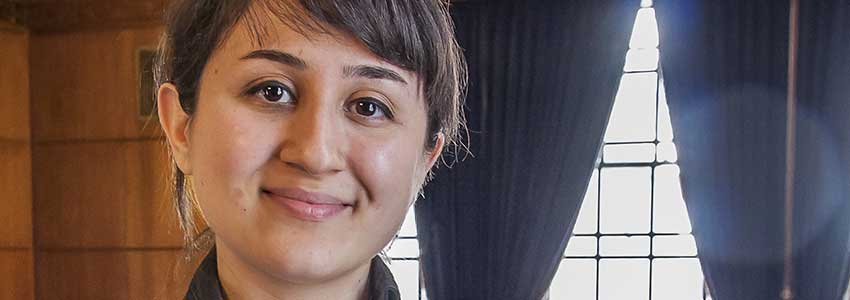A fourth year graduate student, Parinaz hasn’t been home to Iran since she arrived at U-M. “I have a single-entry visa. If I go back, I have to re-apply for a new visa, and I know people who do that, but it is a time-consuming process,” she explains. She has a home away from home here, though. “There was a big adjustment – a new language and environment, but Ann Arbor and U-M are very welcoming of international students. There are good Iranian student associations, and many engineering students are from Iran, so I have a lot of ‘home’ here with me. Actually, my best friend from elementary school is in my cohort, and family is around the corner, sort of. My sister is in graduate school in Montana.“
She explains that studying abroad for grad school is common in Iran, and she was most interested in studying in the U.S. U-M was an easy choice, since it is one of the top electrical engineering schools in the country. She was also influenced by her faculty advisor, competitive funding package, and the fact that she already had a community of friends here.
“My faculty advisor is female, and she is such an important role model. It is interesting to see how she does things in a field where there aren’t many women. I feel I learn a lot from her.”
She thinks her Iranian undergraduate experience gave her a good foundation for graduate school, as her final project involved doing research with faculty, reading papers, and solving mathematical problems. She says, “Research is so much more than just your field, it involves English, math, computer science, electrical engineering, economics, among so many others. Everything has to be in there to make it happen – it is so much more than I imagined.”
“Rackham helps make that easier, with so many dual-degree options. Here it is so easy because you are encouraged to be at the intersection of multiple disciplines. I wanted to work also in microeconomics, and my advisors said ‘of course, go, do it,’” she continues.
Parinaz’ primary research interest lies in applying methods in mathematical economics, specifically game theory and mechanism design, to problems in the field of computer and network security. “The problem I’m working on now is cyber insurance, an intersection of economics and computer science that results in shaping behaviors of individuals to make a more secure system. There are a lot of challenges to making it work, and the process is highly theoretical at this point.”
Her biggest challenge now is a common theme among graduate students – time management and balancing the need to do research with required coursework. Parinaz comes to central campus for a break from her studies, grabbing a coffee or walking around town. When she has real down time, she enjoys biking around Ann Arbor and exploring new restaurants with friends.
She hopes for a faculty position after she completes her doctoral degree, most likely pursuing a postdoctoral fellowship immediately after graduation.
Her advice to new students is, “Stand back from the undergraduate mentality where you’re focused on courses, and think more about your research. As soon as you start putting the two of them together, your classes will make more sense as you apply what you are learning. Ann Arbor is beautiful – get out and explore it! Make the time to enjoy it.”

